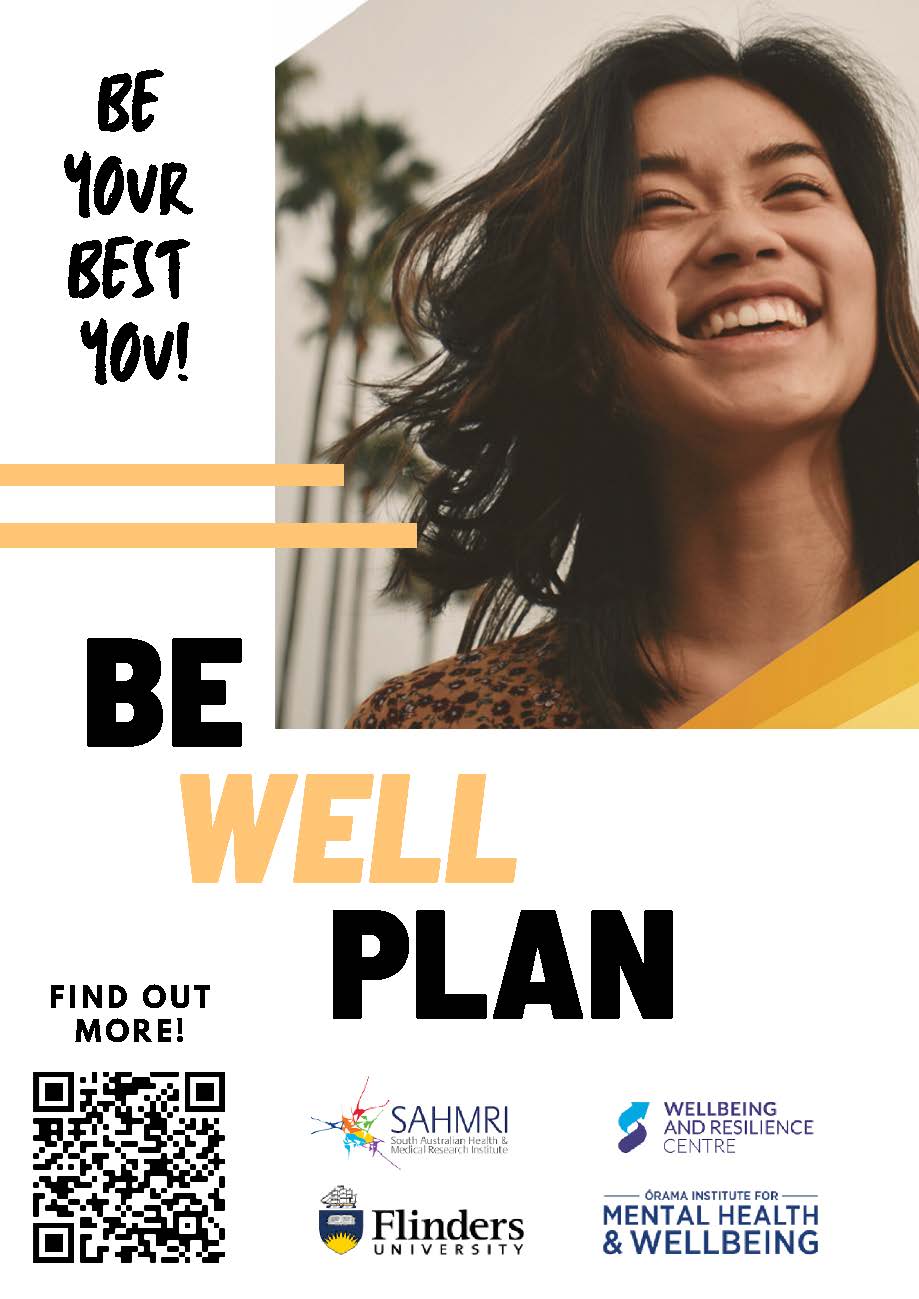I am a Be Well Plan trainer. In fact, there are a few of us trainers here at the University – staff and students.
For the last few years I have had the pleasure and honour to be able to train 100+ students in this innovative mental health and wellbeing program.
I talk about it a lot in my work, so I thought it was about time that I provide a written description of the program for those who want to learn more about it. You’ll also find details on how to do the program here at Flinders in this post.
The Be Well Plan
The Be Well Plan is an interactive program in which we will teach you how to build a tailored wellbeing and resilience plan that you can use at any stage of life to get yourself back on track, cope with difficult times, or simply enhance your mental health and wellbeing.
There are two versions. One is a 5 x 2-hour set of workshops. The other is a one-day (6 hour) workshop + access to a dedicated mobile app.
In both versions of the program we cover a range of interesting topics (self-compassion, thinking errors, resilience planning, thought defusion, coping strategies, mindfulness and more) and introduce you to a catalogue of wellbeing-related activities from which you can pick different ones to try out in your own life.
We don’t just focus on what kinds of activities are helpful for building mental health, we also focus on how to get those activities embedded into everyday life. We cover goal setting, habit formation and how to build a strategic and deliberate ‘plan’ for how you will care for your mental health.
On top of this, the group nature of the program means you get to surround yourself with other people who are also working to build a better life for themselves, which we pretty much always find leads to a great sense of camaraderie and collective motivation.
The program is built on the evidence-based assumption that individuals can wield some power in shifting their mental health and wellbeing. This isn’t to say that mental health is entirely the responsibility of the individual. On the contrary, the program explores specifically how we respond to the inevitable and sometimes very impactful things that happen to us. But, by learning some psychological tools, we can often reduce the negative impact that the inevitable challenges of life have on us.
You can learn more from reading the formal flyer.
Why you should do the program
First up, it works! It has been shown in a couple of trials [1,2] to improve a range of mental health outcomes.
“The Be Well Plan program was effective in improving mental health and well-being, including mental well-being, resilience, depression, and anxiety. Participant satisfaction scores and attendance indicated a high degree of engagement and satisfaction with the program.”
But it is also a practical program that helps you navigate a complex area – the human mind!
The human mind is a complex beast! And the health of our mind shapes our overall quality of life. With a healthy mind comes better mood, better productivity, better social integration, a sense of meaning and purpose, the ability to manage stress, the ability to make good decisions/choices and the capacity to manage periods of mental ill health.
There is a good chance that no-one necessarily taught you how to look after your mind, even though it’s a skillset all of us need to learn.
The Be Well Plan teaches you some of the fundamental aspects of how to look after your mind and grow and sustain your mental health. In the same way as you do things to look after your physical health, the Be Well Plan will teach you what to do to look after your mental health.
Oh, and it’s also free. Accessing a program like Be Well Plan in the community would typically come at a cost, but as a Flinders University student, you get access to this program for free 🤑
Oh, there are also masterclasses!
In 2021, The Be Well crew started releasing additional content that builds on the core program.
In fact, once you have completed the core program, you then have access to a growing range of 1-hour Masterclasses in which we dig further into some of the topics covered in the program. For example we do a deep-dive on meaning/purpose, self-compassion, psychological flexibility and more.
These masterclasses give you the opportunity to upskill yourself further in these areas.
Masterclasses will increase in 2024
Sounds great! How do I access the program?
We are taking registrations for a final Be Well Plan for 2023. If you are interested in doing the program, just email me (gareth.furber@flinders.edu.au) and I’ll put you on a mailing list to be contacted when we have final details.
We’d love to see you at one of these programs. Looking forward to working with you 😊
Gareth
Be Well Trainer



